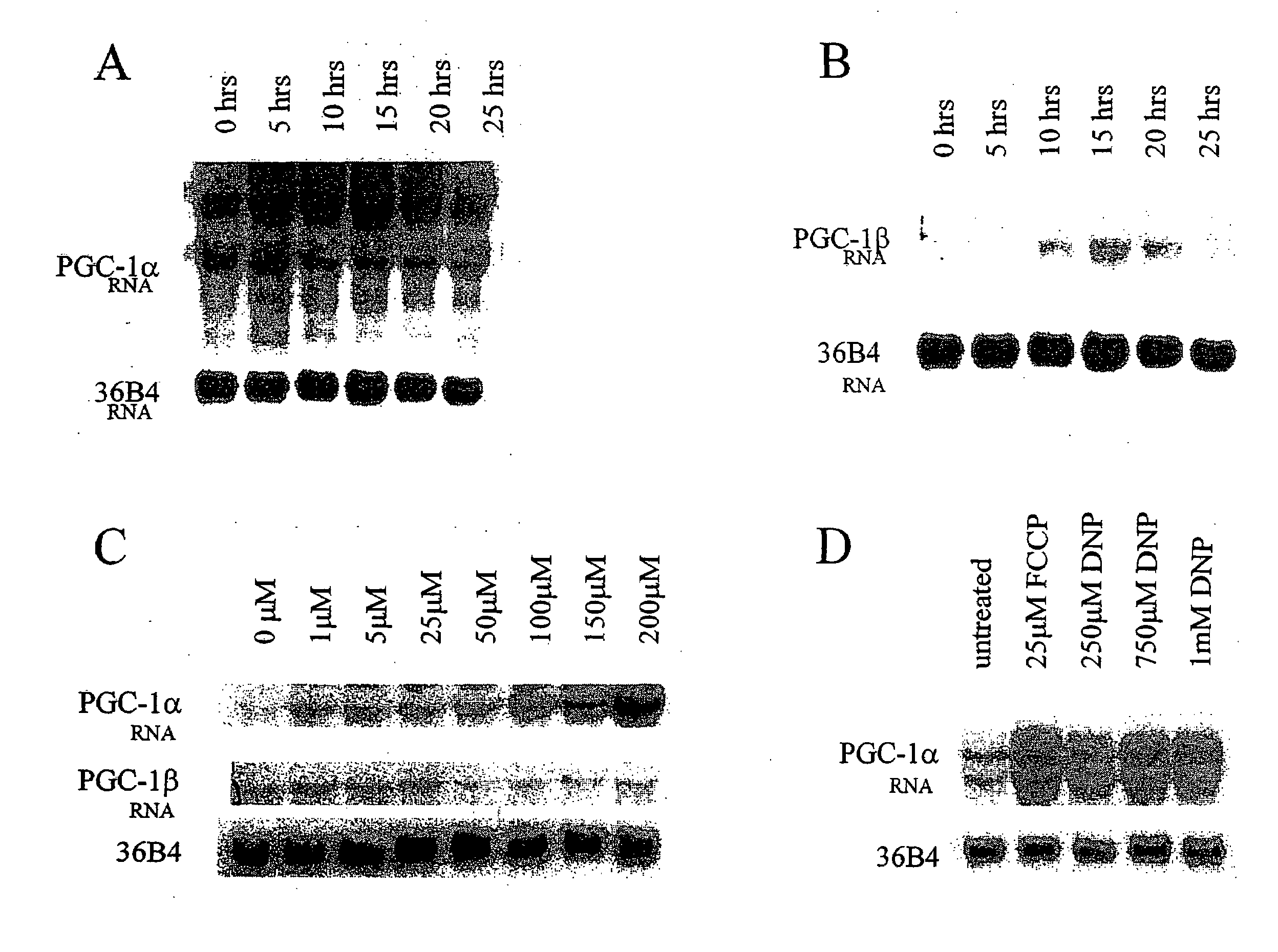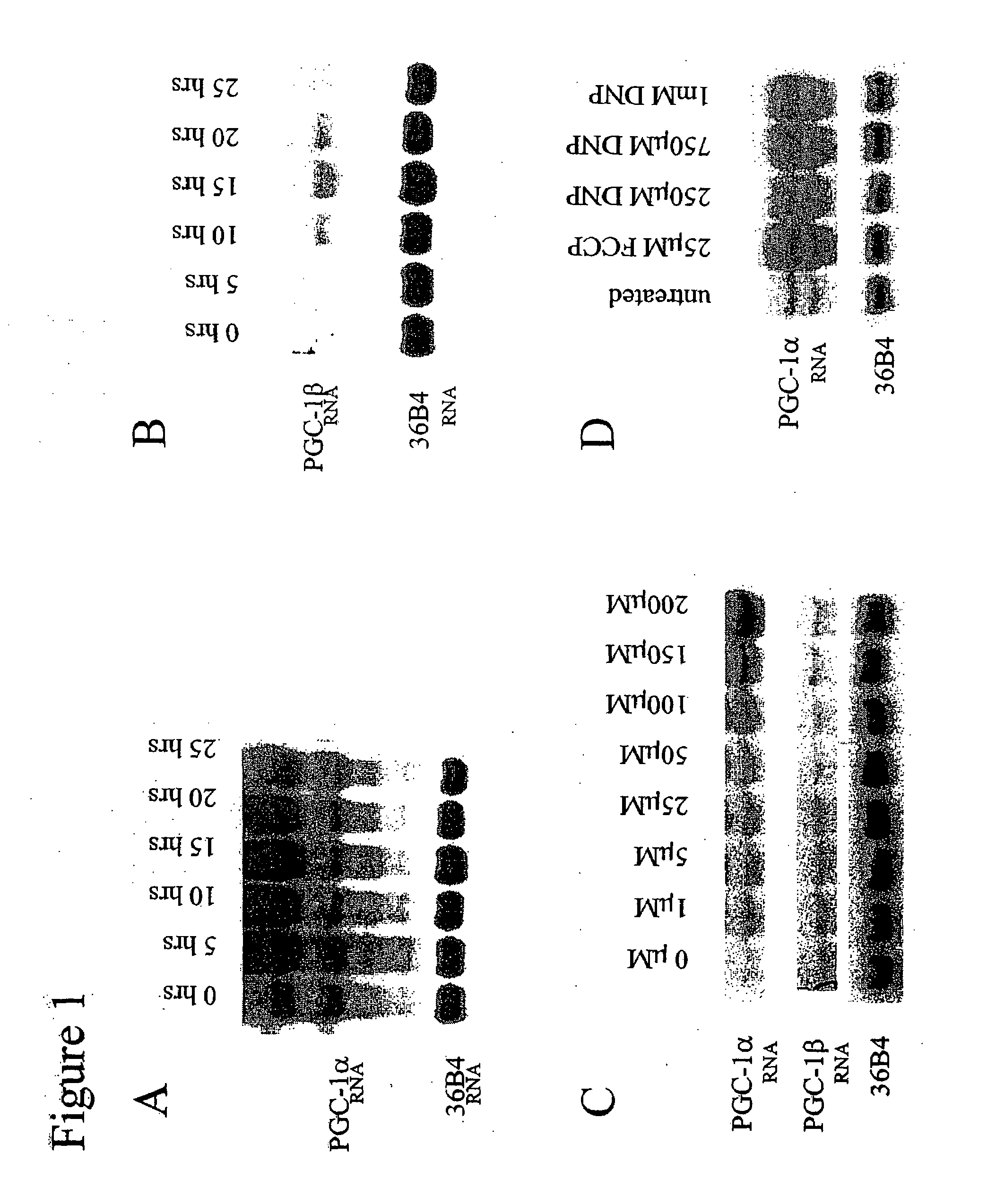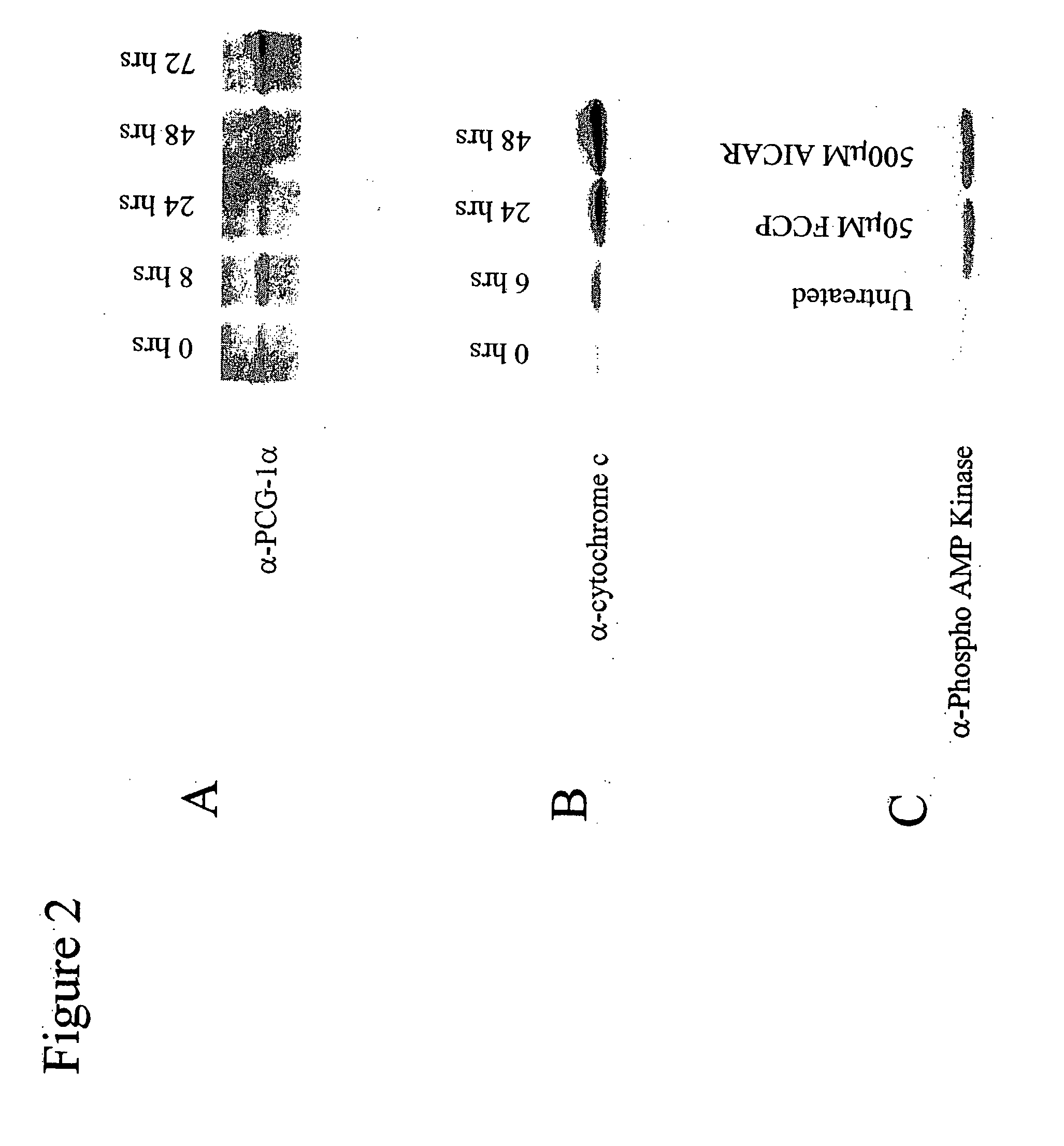Methods and Compositions for Treating Obesity
a composition and obesity technology, applied in the field of obesity treatment methods and compositions, can solve the problems of hypertrophic and hyperplastic growth, high mortality, serious side effects, etc., and achieve the effect of increasing the metabolic activity of the cell
- Summary
- Abstract
- Description
- Claims
- Application Information
AI Technical Summary
Benefits of technology
Problems solved by technology
Method used
Image
Examples
example 1
FCCP Mediates Induction of PGC-1α Expression in Brown Fat
[0146]This example describes the expression of PGC-1α and PGC-1β RNA in HIB1B brown fat cells after treatments with FCCP or DNP. It also describes the downstream effects of FCCP treatment of HIB1B cells. Further, it describes the activation of AMP kinase after treatment with FCCP.
Materials and Methods
HIB1B Growth Conditions
[0147]HIB1B brown fat cells were grown in DMEM (10% cosmic calf serum)+0.25 mg / ml penicillin / streptomycin at 37° C., 10% CO2.
Treatments and Procedures
[0148]In FIGS. 1A and 1B, HIB1B cells were treated with 25 μM FCCP for 0-25 hours. In FIG. 1C, HIB1B cells were treated for 5 hours with 0-200 μM FCCP. In FIG. 1D, cells were treated for 5 hours with either FCCP or DNP as indicated in the figure. RNA was extracted using trizol and was resuspended in ddH2O. RNA was run on a 1% agarose-formaldehyde gel, and 30 ug of RNA was used per lane. The gel was transferred onto a nylon membrane, and the membrane was probed ...
example 2
FCCP Induction of Metabolic Stress
[0155]This example describes the cellular ATP levels in HIB1B brown fat cells after treatment with FCCP.
Materials and Methods
HIB1B Growth Conditions
[0156]HIB1B brown fat cells were grown in DMEM (10% cosmic calf serum)+0.25 mg / ml penicillin / streptomycin at 37° C., 10% CO2.
Treatments and Procedures
[0157]In FIG. 4, HIB1B cells were treated for either 5 or 10 hours with either 0 μM or 25 μM FCCP. ATP levels were measured using the Calbiochem ATP assay kit. For analysis, ATP levels were compared to those of untreated cells at the 5 and 10 hour time points.
Results
[0158]As shown in FIG. 4, treatment of HIB1B brown fat cells with 25 μM FCCP caused a decrease in cellular ATP levels. Cellular ATP levels dropped 25% in cells treated with FCCP for 5 hours. After 10 hours of treatment with FCCP, ATP levels were approximately 20% below that of untreated cells. Accordingly, respiration uncoupling agents act to reduce cellular ATP levels, and this reduction is sus...
example 3
Atractyloside / Antimycin A-Mediated Induction of PGC-1α
[0159]This example describes the expression of PGC-1α in HIB1B brown fat cells after treatment with Atractyloside, an inhibitor of the adenine nucleotide transporter, or Antimycin A, a complex III inhibitor.
Materials and Methods
HIB1B Growth Conditions
[0160]HIB1B brown fat cells were grown in DMEM (10% cosmic calf serum)+0.25 mg / ml penicillin / streptomycin at 37° C., 10% CO2.
Treatments and Procedures
[0161]In FIG. 5A, HIB1B cells were treated with 0-15 μM Antimycin A, a Complex III inhibitor. In FIG. 5B, cells were treated for either 5 or 10 hours with 0-50 μM Atractlyoside, an adenine nucleotide transporter (ANT) inhibitor. RNA was extracted, run on a formaldehyde gel and transferred to a nylon membrane as previously described. Membranes were blotted for PGC-1α mRNA.
Results
[0162]As illustrated in FIG. 5, other mitochondrial inhibitors also caused PGC-1α expression levels to increase. FIG. 5A shows PGC-1α expression increased after ...
PUM
| Property | Measurement | Unit |
|---|---|---|
| real time PCR | aaaaa | aaaaa |
| real time PCR | aaaaa | aaaaa |
| real time PCR | aaaaa | aaaaa |
Abstract
Description
Claims
Application Information
 Login to View More
Login to View More - R&D
- Intellectual Property
- Life Sciences
- Materials
- Tech Scout
- Unparalleled Data Quality
- Higher Quality Content
- 60% Fewer Hallucinations
Browse by: Latest US Patents, China's latest patents, Technical Efficacy Thesaurus, Application Domain, Technology Topic, Popular Technical Reports.
© 2025 PatSnap. All rights reserved.Legal|Privacy policy|Modern Slavery Act Transparency Statement|Sitemap|About US| Contact US: help@patsnap.com



